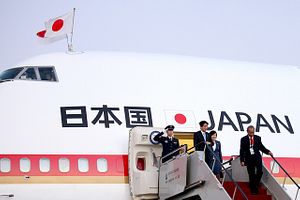As Japanese Prime Minister Shinzo Abe undertakes a trip through Oceania, defense and energy ties are expected to feature prominently. Abe left on Sunday and will visit with key partners New Zealand, Australia and Papua New Guinea (PNG). While news from his meeting with New Zealand Prime Minister John Key shows this leg of his journey may prove uneventful, Abe is expected to sign significant deals while in Australia. The recent and significant uptick in ties between Japan and Australia since the details of their free trade agreement were agreed in April has underlined their shared interests, of which their security ties China have become particularly sensitive. Japan, Australia and PNG all share an interest in establishing economic ties beyond the reach of China’s envisioned “second island chain” of influence reaching out into the Western Pacific. Building trade ties and security arrangements that avoid the increasingly troubled South China Sea are a logical next step.
Abe’s stopover in New Zealand has not been successful, as Japan’s controversial whaling industry in the South Ocean has dominated discussions and media coverage. While their bilateral trade is not a significant percentage of Japanese trade (just shy of $6 billion in 2013) New Zealand is highly critical of Japan’s protectionist agricultural policies and has vowed to block its entrance into the Trans-Pacific Partnership (TPP) if they go unchanged.
The visit to Australia is expected to be much more fruitful for Abe and Australia’s Prime Minister Tony Abbott. As Abe was beginning his trip on Sunday, Abbott confirmed he would sign the FTA between the two countries, despite the Labor opposition’s argument that the government had not run an economic modeling exercise of such an agreement since 2006. The government instead cited an April report from Meat and Livestock Australia that stated the FTA would increase Australian beef sales by $5.5 billion over the next 20 years, with tariffs declining from 38.5 percent for frozen and chilled beef to 19.5 percent and 23.5 percent over the next 15 years.
However, the signing of the FTA may be the least significant part of Abe’s Australia visit. He will become the first Japanese prime minister to address the country’s parliament in Canberra, and will also attend a cabinet-level meeting of the National Security Committee. Abe and Abbott have a strong working relationship, with Abbott calling Japan Australia’s best friend in Asia in October last year. The two are also expected to finalize details on a defense technology trade deal that could include Australia purchasing Japanese submarines. Japan is Australia’s second largest trading partner with bilateral trade reaching $70 billion in 2013 (although that is only half its Chinese bilateral trade of $140 billion), and the upcoming free trade, defense, and energy deals will significantly increase Japan’s percentage of Australian trade in the coming years.
Speaking of energy deals, Japanese government sources said on Sunday that the country plans to double its imports of natural gas from Australia and PNG over the next five years. Not only will the government double imports, but it plans to ship them via the Pacific Ocean, so as to avoid the increasingly hostile disputes in the South China Sea and southwestern portion of the East China Sea. Currently sixty percent of Japan’s natural gas imports go through this tense geopolitical region. The Japan News spoke with government officials who said they want to double Australian imports from 18 million tons (20 percent of total imports) in 2013 to 36 million tons by 2019. In addition to PNG’s new LNG facility that opened in May, Japanese companies are developing new natural gas projects with loans from Japan’s Office of Development Assistance, Japan Bank for International Cooperation, Gas and Metals National Corporation and Japan Oil. Abe will also be visiting Australia’s Pilbara region and Perth to underline Japan’s growing interest in the country’s natural resources.
Both the Japanese and Australian press and leadership are loudly heralding the success of Abe’s visit before he even lands in Canberra. While the energy and free trade deals are expected, the details of the defense technology deal will be watched closely by China and the U.S. Japan is already set to make its first shipment of arms to the U.S. later this month, after removing a self-imposed ban in April. While this initial deal is just for a sensor to be used in the Patriot Advanced Capability-2 (PAC-2) missile defense system, the scope of its potential Australia deal would be significantly larger. It is the comprehensiveness of this deal, Australia’s eagerness in creating a more robust security relationship with Japan, and the rapidity with which Abe has managed to change the country’s once pacifist military nature that will likely sound alarms in Beijing.

































